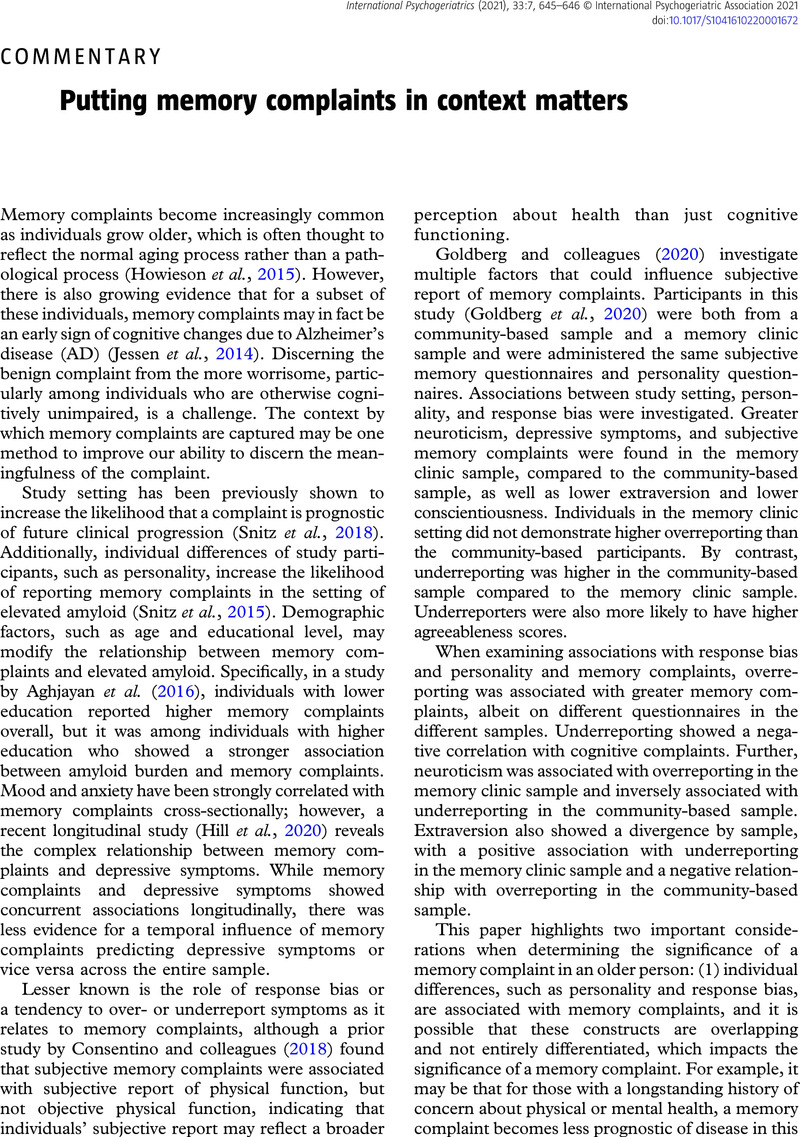No CrossRef data available.
Article contents
Putting memory complaints in context matters
Published online by Cambridge University Press: 26 July 2021
Abstract
An abstract is not available for this content so a preview has been provided. Please use the Get access link above for information on how to access this content.

- Type
- Commentary
- Information
- International Psychogeriatrics , Volume 33 , Special Issue 7: Issue Theme: Cognitive Aging: Subjective and Objective , July 2021 , pp. 645 - 646
- Copyright
- © International Psychogeriatric Association 2021
References
Aghjayan, S. L. et al. (2016). The influence of demographic factors on subjective cognitive concerns and beta-amyloid. International Psychogeriatrics, 29, 645–652.CrossRefGoogle ScholarPubMed
Amariglio, R. E. et al. (2018). Amyloid-associated increases in longitudinal report of subjective cognitive complaints. Alzheimers Dement (NY), 4, 444–449.CrossRefGoogle ScholarPubMed
Barnes, L. (2014). Alzheimer’s disease in African Americans: risk factors and challenges for the future. Health Affairs, 33, 580–586.CrossRefGoogle ScholarPubMed
Cosentino, S., Devanand, D., Gurland, B. (2018).
A link between subjective perceptions of memory and physical function: implications for subjective cognitive decline. Journal of Alzheimer’s Disease, 61, 1387–1389.CrossRefGoogle ScholarPubMed
Goldberg, S. M. et al. (2020). The roles of study setting, response bias, and personality in subjective memory complaints of cognitively normal older adults. International Psychogeriatrics, 33, 665–676. doi: 10.1017/S1041610220000319
Google Scholar
Hill, N. L. et al. (2020). Longitudinal relationships among depressive symptoms and three types of memory self-report in cognitively intact older adults. International Psychogeriatrics, 32, 719–732.CrossRefGoogle ScholarPubMed
Howieson, D., Mattek, N., Dodge, H., Erten-Lyons, D., Zitzelberger, T., Kaye, J. (2015). Memory complaints in older adults: prognostic value and stability in reporting over time. SAGE Open Medicine, 3, 1–7.CrossRefGoogle ScholarPubMed
Jessen, F. et al. (2014). A conceptual framework for research on subjective cognitive decline in preclinical Alzheimer’s disease. Alzheimers Dement (NY), 10, 844–852.CrossRefGoogle ScholarPubMed
Snitz, B. E. et al. (2015). Subjective cognitive complaints, personality, and brain amyloid-beta in cognitively normal older adults. American Journal of Geriatric Psychiatry, 23, 985–993.CrossRefGoogle ScholarPubMed
Snitz, B. E. et al. (2018). Risk of progression from subjective cognitive decline to mild cognitive impairment: the role of study setting. Alzheimers Dement (NY), 14, 734–742.CrossRefGoogle ScholarPubMed


